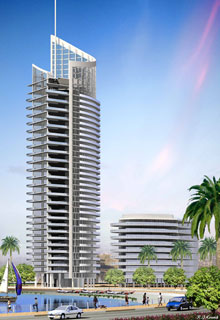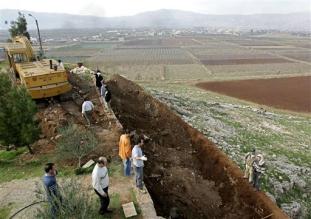 Despite deep economic and political crises, Lebanon is facing an unprecedented property boom, spurred by the appetite of developers, expatriates and Gulf Arabs.The boom started last year despite dramatic events that shook the country, and which turned on the assassination of former premier Rafiq Hariri, with property prices soaring an average of 50 per cent.
Despite deep economic and political crises, Lebanon is facing an unprecedented property boom, spurred by the appetite of developers, expatriates and Gulf Arabs.The boom started last year despite dramatic events that shook the country, and which turned on the assassination of former premier Rafiq Hariri, with property prices soaring an average of 50 per cent.
Beirut has witnessed a major face-lift with the new construction boom, mostly in the once war-ravaged downtown area being rebuilt by the private company Solidere, which runs properties valued at about $5 billion.Brand new residential high-rises financed by Lebanese and Gulf investors now tower over the marina near the seafront road where Hariri was killed in a massive car bombing in February 2005.
"Very often, when the first picks strike the ground at the construction sites, between 75 and 80pc of these projects are already sold to rich Lebanese or Arab nationals," Raja Makarem, manager of Ramco realty, said.Victor Najarian, director general of CARE realty, said "we are managing about 15 projects worth a total value of $1 billion and we hope to double that amount within a year."
by Henri Bou-Saab in Beirut for scoop.co.nz, It is coming up to mid-summer in Lebanon. The coastal cities of Tripoli, Beirut and Sidon are very hot during the daytime and everyone looks forward to the evenings to enjoy social gatherings and their families without the pressure of the heat. For those interested in the development of our democracy and building a stronger society, there is plenty to talk about around the dinner table in the evening breeze.
One is what to do next about our antiquated electoral law. No one can say that citizens have been short-changed in their choice of candidates and political parties in the 79 years since our first parliamentary elections, back in 1927.One is what to do next about our antiquated electoral law. No one can say that citizens have been short-changed in their choice of candidates and political parties in the 79 years since our first parliamentary elections, back in 1927.
We have the oldest secret ballot parliamentary system in the Middle East and one of the common jokes here is that there are 130 parties in the 128-member parliament. Unlike the State of Israel, which forbids most of its people who are Moslem or Christian from voting or even living in their own country and instead leaves them stranded in refugee camps in neighbouring countries, the Republic of Lebanon
Catholic News Service, By Doreen Abi Raad, BEIRUT, Lebanon
 The Associated Press , BEIRUT, Lebanon
The Associated Press , BEIRUT, Lebanon
Khazen History


Historical Feature:
Churches and Monasteries of the Khazen family

St. Anthony of Padua Church in Ballouneh
Mar Abda Church in Bakaatit Kanaan
Saint Michael Church in Bkaatouta
Saint Therese Church in Qolayaat
Saint Simeon Stylites (مار سمعان العامودي) Church In Ajaltoun
Virgin Mary Church (سيدة المعونات) in Sheilé
Assumption of Mary Church in Ballouneh
1 - The sword of the Maronite Prince
2 - LES KHAZEN CONSULS DE FRANCE
3 - LES MARONITES & LES KHAZEN
4 - LES MAAN & LES KHAZEN
5 - ORIGINE DE LA FAMILLE
Population Movements to Keserwan - The Khazens and The Maans
ما جاء عن الثورة في المقاطعة الكسروانية
ثورة أهالي كسروان على المشايخ الخوازنة وأسبابها
Origins of the "Prince of Maronite" Title
Growing diversity: the Khazin sheiks and the clergy in the first decades of the 18th century
Historical Members:
Barbar Beik El Khazen [English]
Patriach Toubia Kaiss El Khazen(Biography & Life Part1 Part2) (Arabic)
Patriach Youssef Dargham El Khazen (Cont'd)
Cheikh Bishara Jafal El Khazen
Patriarch Youssef Raji El Khazen
The Martyrs Cheikh Philippe & Cheikh Farid El Khazen
Cheikh Nawfal El Khazen (Consul De France)
Cheikh Hossun El Khazen (Consul De France)
Cheikh Abou-Nawfal El Khazen (Consul De France)
Cheikh Francis Abee Nader & his son Yousef
Cheikh Abou-Kanso El Khazen (Consul De France)
Cheikh Abou Nader El Khazen
Cheikh Chafic El Khazen
Cheikh Keserwan El Khazen
Cheikh Serhal El Khazen [English]
Cheikh Rafiq El Khazen [English]
Cheikh Hanna El Khazen
Cheikha Arzi El Khazen
Marie El Khazen